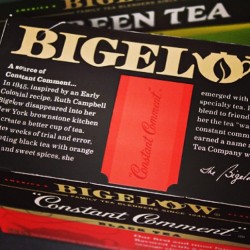Top Class Actions’s website and social media posts use affiliate links. If you make a purchase using such links, we may receive a commission, but it will not result in any additional charges to you. Please review our Affiliate Link Disclosure for more information.

Bigelow argues in its motion for summary judgment that plaintiff Adam Victor cannot sue the company because there is no proof that the Bigelow labels were false.
According to court documents, the Court recently denied class certification for both the damages Class and an injunctive Class, which left only Victor’s individual claims.
“For at least the same reasons this Court denied class certification, summary judgment must also be granted as to all claims because Victor has no evidence to support the merits and elements of his claims,” Bigelow’s motion for summary judgment states.
Bigelow also argues that “Victor has no evidence that reasonable consumers are likely to be misled by his implausible lawyer-created claim.” The company said that a plaintiff must provide extrinsic evidence, such as that gained by a consumer survey, that a significant portion of the public could be misled, and that “anecdotal evidence alone is insufficient” to prove that the public is likely to be mislead by claims.
The statements about antioxidants are verifiable, Bigelow contends, and the company claims that the labels have been changed since Victor’s original lawsuit was filed.
Fraud claims from Victor’s original 2013 proposed class action lawsuit were trimmed in 2014 when a judge ruled that Bigelow’s statements about antioxidants were not considered fraudulent.
Additionally, Bigelow asserts that Victor is unable to seek injunctive relief because he never sustained any injury from drinking the tea, and has stated that he does not plan to buy Bigelow tea again.
“Victor did not suffer any injury as a result of purchasing Bigelow’s black teas, and Bigelow has already removed the alleged mislabeling from all the accused products during its last rebranding campaign,” Bigelow’s motion stated. “There is no injury that can be prevented.”
In September, two plaintiffs in two separate class action lawsuits, one led by Victor and another led by plaintiff Alex Khasin, filed a motion for class certification in California federal court. The two proposed class action lawsuits similarly alleged that consumers paid a premium for Bigelow teas although the products did not actually contain the high stated amount of antioxidants.
Victor and Khasin are represented by the same counsel, and both claimed in their respective proposed class action lawsuits that Bigelow’s teas do not contain enough of the nutrients claimed. Khasin proposed a Class of green tea drinkers while Victor proposed a Class of black tea drinkers in amended claims filed in July 2015.
The court rejected class certification bids for both lawsuits in March.
Bigelow also said that Victor failed to support his claim that he relied on the labels to provide the antioxidant content based on FDA regulations, saying that Victor admitted under oath that he did not know the personal recommended daily intake for antioxidants.
“Victor’s testimony shows that, at the time of his purchase or even after his purchase, he had no expectation Bigelow teas would deliver any specific quantity of antioxidants under the FDA guidelines,” Bigelow stated. “He simply has no understanding of the regulations themselves and did not known whether Bigelow teas had been mislabeled contrary to them. In fact, Victor only came to believe that Bigelow’s products were falsely labeled and therefore ‘unlawful’ after he met with the attorneys representing him in this case.”
Bigelow is officially set to move for summary judgment in a hearing on Aug. 10, 2016 in the U.S. District Court for the Northern District of California.
Adam Victor is represented by Ben F. Pierce Gore of Pratt & Associates and by J. Price Coleman of the Coleman Law Firm.
The Bigelow Tea Class Action Lawsuit is Victor v. R.C. Bigelow Inc., Case No. 3:13-cv-02976, in the U.S. District Court for the Northern District of California.
UPDATE: On July 8, 2016, the plaintiff argued that it would be premature to dismiss his tea labeling lawsuit at this point. Victor claimed that Bigelow is trying to force him to prove his entire case before it even reaches trial.
ATTORNEY ADVERTISING
Top Class Actions is a Proud Member of the American Bar Association
LEGAL INFORMATION IS NOT LEGAL ADVICE
Top Class Actions Legal Statement
©2008 – 2024 Top Class Actions® LLC
Various Trademarks held by their respective owners
This website is not intended for viewing or usage by European Union citizens.















One thought on Bigelow Seeks Summary Judgment in Mislabeled Tea Class Action
UPDATE: On July 8, 2016, the plaintiff argued that it would be premature to dismiss his tea labeling lawsuit at this point. Victor claimed that Bigelow is trying to force him to prove his entire case before it even reaches trial.